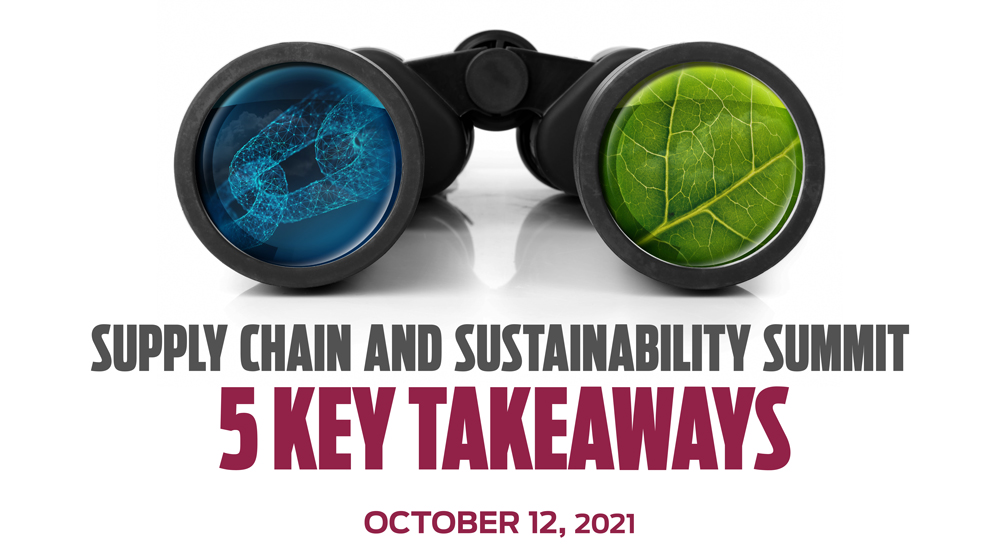5 Takeaways from the 2021 Supply Chain and Sustainability Summit

As demand for supply chain infrastructure and intellect continues to grow at a rapid pace, the need for professionals with a sophisticated understanding of the field’s future has never been greater. Between the impending climate crisis and persisting racial and political tensions, the American public has never been more critical of where companies spend their money and how they treat their people.
To get a glimpse into how some of America’s biggest supply chains are evolving to meet new demands, Loyola University Chicago’s Supply Chain and Sustainability Center hosted their annual Summit of industry experts including Fortune 500 executives, high ranking government officials, and seasoned litigators. Below are some of the main insights from their testimonies.
1. Cloud Based Infrastructure is the Key to Developing a Fast Moving Digital Culture
“The most competitive companies right now are the ones that understand that while the cloud can provide cost savings, the real benefit is the speed and agility it can enable,” says Dave Galatte, Customer Health and Delivery Field Enablement Leader at Amazon Web Services (AWS). As supply chains become increasingly dependent on the handling and transformation of data, any company with a slow and expensive data storage setup will lag behind those with an efficient one. Pivoting to the cloud not only makes it possible for leaders and organizations to launch new digital experiences more quickly, but also allows them to react to market forces faster.
Transitioning to the cloud, however, is the “easier part of transforming to a fully digital business,” says Galatte. The harder part is the transformation of organizational culture from an in house ownership framework to a distributed ownership framework.
The companies that are able to capitalize on both the technological and organizational shift towards the cloud “will be the leaders of the future,” says Galatte.
2. The Shift from the Linear Economy to the Circular Economy
For nearly all of human history we have operated under a linear economic model. Deplete natural resources to make goods, sell the goods, then dispose of the goods. Though this model has worked up to this point, the continual degradation of Earth’s natural resources is wholly unsustainable moving forward.
In an effort to curb the continual depletion of Earth’s resources, Jason Feldman, Co-Founder of Green Era Sustainability, proposes a shift to what many call “the circular economy” — an economic model in which waste from final goods is repurposed into things that can become inputs to make new goods.
“Decoupling economic activity from the consumption of finite resources allows us to achieve a much more sustainable economy,” says Feldman. With Green Era, Feldman has focused his attention primarily on the food industry — using composting technology to turn food waste into soils and fertilizers that can be used to grow more food.
Watch Jason's full presentation here.
3. ESG Reporting is More Than Altruism – It’s Good Business
The big long-term question in global supply chains right now is “how are companies planning to address climate change,” says Pete Tomsai, a lawyer with Foley & Lardner and a member of their Environmental Regulation Practice team. As climate concerns become more ingrained in the lives of consumers each day, focusing on sustainability has become “less about marketing and more about mitigating risks,” says Jenna Kunde, the Global Director of Sustainability for Johnson Controls, Inc.
“We have found an increasingly sophisticated interest by our investors for sustainability reporting,” Kunde continues. “They want to know what your risks are and what your opportunities are when it comes to environmental, social, and governance (ESG).”
Couple the climate crisis with the social unrest and political polarization of 2021, and it becomes clear why investors are so interested in where companies stand on sweeping cultural issues. As we’ve seen over the past year with the tragedies of George Floyd and Breonna Taylor — among many others — it only takes one misstep for consumers to completely, and rightfully, abandon a company. For investors, there’s no better way to quell these fears than thorough ESG reporting.
Watch the full presentation here.
4. Positive Employee Morale is Fundamental to Sustaining Supply Chains Long Term
The most notable bottleneck in supply chains right now is transportation workers. Unloading ships and getting goods from point A to point B is simply not possible without a steady supply of dependable truck drivers and warehouse workers — a supply that does not exist at the moment. Rather than push the workers you do have into burnout, Mari Roberts, the VP of Transportation at Frito Lay, says “we must take care of our employees as they take care of everything else.”
With so much demand and uncertainty in the field right now, it’s important to make sure “there are elements and processes in the workplace that employees can fall back on,” says Sarah Burke, President of U.S., Martin Brower (a division of Reyes Holdings). Whether it be consistency in communication or scheduling, employees need a sense of predictability and direction in a time of so much upheaval. Without it, the labor shortage will only continue to worsen.
5. Diverse Organizations are Efficient Organizations
“Firms that are more diverse and more inclusive drive greater outcomes and greater returns on investment,” says Marquis Miller, Chief Diversity Officer of the City of Chicago. Similar to ESG reporting, diversity in businesses is less about altruism, or “inclusivity for the sake of inclusivity”, and more about creating a high functioning workplace environment.
In talking with Chris Kitzman of Loyola’s executive MBA program, Miller emphasized the city’s workforce development programs as a way to achieve diversity.
“Whenever you are able to put people to work, they are able to provide funding to their family members, to the communities they live in, and to all other communities around the city,” says Miller. With so much demand for labor in supply chains right now, what better investment than the people in communities who need it most.
